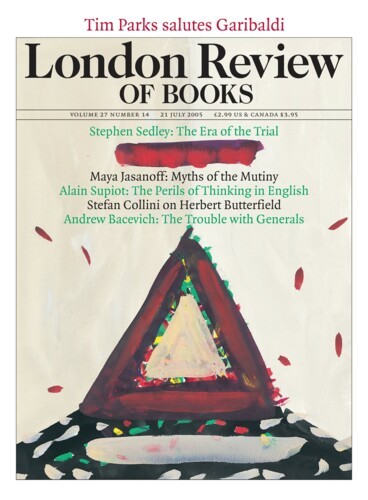Today is Thursday 7 July, a date which is likely, by the time this issue of the LRB is read, to have been abbreviated to 7/7, even if the atrocity in London proved a lot less horrific in its consequences than 9/11. Thursday being this paper’s day for going to press, I’d written for ‘Short Cuts’ a few hundred mildly disobliging words about London’s having been awarded the 2012 Olympics. I was more pleased than I’d expected to be, but the overjoy of some people was hard to fathom; was that excessively jubilant crowd in Trafalgar Square, I asked myself, a gathering of Balfour Beatty shareholders? If the Olympics coming to London means that rundown bits of the city are going to be ‘regenerated’, all well and good, but you have to wonder why it takes the Olympics to bring about that thoroughly desirable change.
I was getting ready to bring my words to that effect into the Bloomsbury offices of the LRB when I heard about the blasts on the Underground. ‘Short Cuts’ could clearly no longer be about the Olympics, even though my first thought was that there might be a connection. Could whoever had let off the bombs – and the only group to have claimed responsibility at the time of writing is something called, naively, the Secret Organisation of al-Qaida in Europe – have been so incensed by London’s success as to want to put a quick and murderous end to the jollifications? Hardly. This attack couldn’t have been planned in 24 hours, though the dark hints we’re always hearing that planning such terrorist coups de théâtre takes long months or even years, have to be nonsense, as though the length of time spent in silent preparation has somehow to be commensurate with the severity of the outcome. London might well not have won the IOC vote in any case, as it mightn’t indeed had the bombs gone off two days earlier. If they were timed to coincide with an event, it could only be with the G8 meeting in Scotland, to which it so happens significant numbers of London policemen had been sent, to help stop the balaclava-ed anarchists.
Tony Blair, taking time off from the feasting and shoulder-rubbing at Gleneagles, said that the summit would continue, that the terrorists were ‘trying to use the slaughter of innocent people to cow us, to frighten us out of doing the things that we want to do’: words that might not have been so well received in downtown Baghdad. It might have been better if George Bush hadn’t been hovering behind Blair’s right shoulder. The sight of the two of them together did a lot to clear the mind of thoughts of the Olympics or even the G8 meeting itself as the motive behind the London bombs, which certainly weren’t let off to show solidarity with the African poor. Far and away the most rational motive was the one that in the immediate aftermath seemed barely able to speak its name: Iraq.
Which gives one to reflect that if the bombs had gone off at the end of April, instead of early July, i.e. shortly before the general election, the pattern of voting might well have been significantly altered, and the connection with Iraq aired instantly and to beneficial effect. Bear in mind what happened in Spain, where the Aznar government was bundled out of office by an electorate that had been twice outraged by it, first when it supported the war at a time when opinion polls showed the majority against the war to be larger in Spain than anywhere else in Europe, and then by Aznar’s breathtakingly squalid attempts to pin the blame for the Madrid bombings on the Basque separatists.
The Mayor of London, Ken Livingstone, did a lot better than the prime minister. Instead of coming out with airy and pious abstractions about ‘the British way of life’, or about our ‘civilisation’ and their ‘barbarism’, he spoke specifically and concretely of London. He may also have been making a veiled appeal to the government not to use the attacks as an excuse to tighten even further its rules on immigration and asylum.
Some hope is all I can say. Given how hard people have had to work to stop Charles Clarke’s Home Office sending asylum seekers they claim aren’t genuine back to Zimbabwe, of all places, that Blunkettised arm of government may well be rubbing its hands at the prospect of extra controls, tighter surveillance and many more detentions unaccompanied by any court proceedings opened up by a terrorist atrocity we had many times been assured by senior policemen was bound to happen. The Thursday bombers have played into the hands of an administration that has left us in no doubt that a general state of insecurity, whereby our lives may be at risk as we set off across London, or anywhere else, on our way to work, is a state it is very content for us to remain in. Somewhere in John Kampfner’s excellent book on Blair’s Wars, there is a quote I found more chilling in its smugness than anything else in the volume. It had Jack Straw saying to a journalist words to the effect that ‘It’s at times like this that the country needs people like Tony and me.’ ‘Times like this’ have come round again. Alas.
Send Letters To:
The Editor
London Review of Books,
28 Little Russell Street
London, WC1A 2HN
letters@lrb.co.uk
Please include name, address, and a telephone number.

